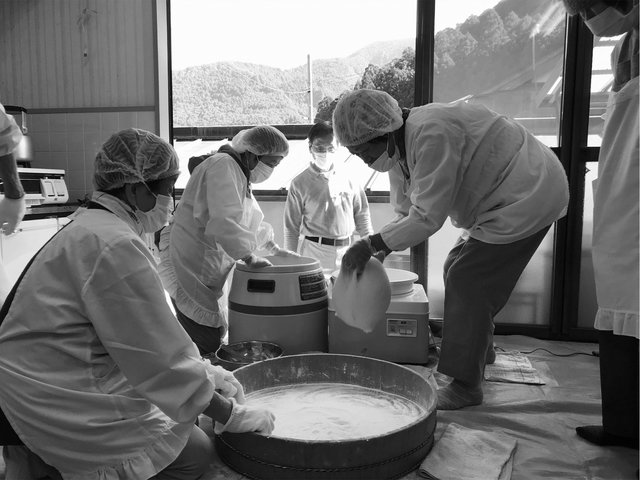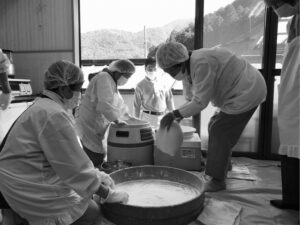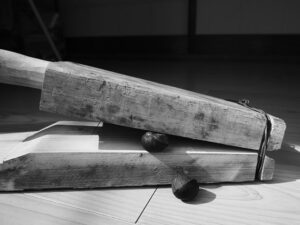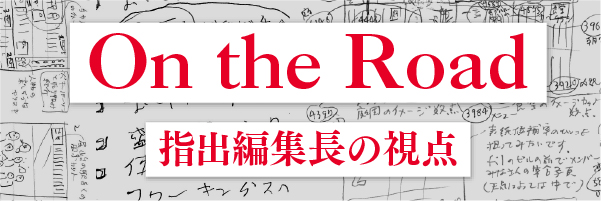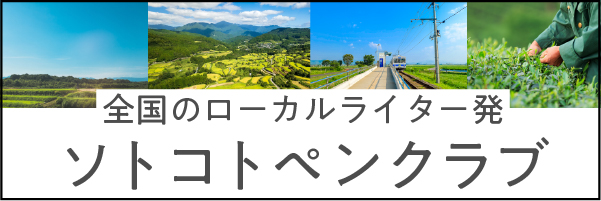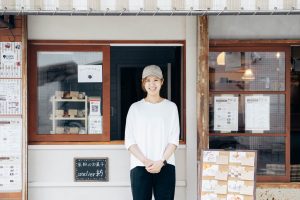秋祭りの2日前、川上村上多古地区のおばちゃんたちは朝早く公民館に集まり、80キロの餅米を洗った。翌日、彼女らはまた公民館に集まり、その餅米を蒸し、餅つきの作業をした。大きな木槌と臼を使って餅つきをする地区があるけど、平均年齢が72歳である上多古の住民は、餅つきの力仕事を少し楽にするためにいつも餅つき機を使う。しかし、まだ楽な作業ではない。餅は熱くて、ついたり、切ったりするのが大変だ。おばちゃんは餅つき機を使って、しゃもじで餅の塊を回したり、裏返したりした。そのおばちゃんはしゃもじの使い方を見せながら、経験で身についた知恵を年下の人に伝えた。おっちゃんたちは餅を1個ずつ長い板の上に並べた。
その日の作業が終わったら、僕はおばちゃんと一緒に公民館の台所でコーヒーを飲みながら、少し立ち話をした。「普段会えないからな、みんなでこういう仕事をするのが楽しい」と一人は説明してくれた。僕はおばちゃんの言いたかったことが分かった。僕は4年前に上多古に最初に引っ越してきた時、お手伝いの責任感で餅つきに参加したが、2年目からこの日を楽しみにしていた。僕は両手で1個の餅を上手に丸められなかった時、隣のおばちゃんに優しく教えてもらった。手前の丸坊主のおっちゃんはヘアネットを被り、大きな笑顔で作業をしていた。普段、僕はこの二人になかなか会えないけど、餅をつきながら良い時間を一緒に過ごせた。
翌日の秋祭りで僕らはその餅を上多古の大年神社にお供えした。男性たちは祭儀の前に、お供えする餅、鯛、果物、と野菜を本殿で整理した。僕らは前年の写真を参考にしたが、結局、その写真より年上のおっちゃんの指示のほうが強くて、説得力があった。静かな祭儀の後、僕らは餅を神社から公民館に持って帰った。お弁当を食べ、お酒を飲む祝いの後、この3日間の締めに、待ちに待った「餅撒き」をした。僕は長い木箱から餅を両手ですくってみんなのほうへ撒いた。老若男女すべての人が興奮しながら、餅を熱心に拾った。
上多古の人は秋祭りの伝統を手と言葉で守るから、この祭りがとても社交的な役割を果たす。その伝統を守るために、普段なかなか集まらないみんなは、この3日間だけに集まる。餅つき機やお供え物の写真のようなテクノロジーを入れても、地元の文化がおばちゃんやおっちゃんの言葉で大切に代々受け継がれてきた。僕も人の言葉を聞き、自分の手で1個の餅を丸めることによって、この伝統の受け継ぎ方を垣間見られた。
Vol.18 The Kodako Autumn Festival
Two days before the Autumn Festival, the older women of Kawakami Village’s Kodako gathered early in the morning at our community building to wash 80 kilograms of mochi rice. They gathered at the community building again the next day to steam that mochi rice and pound it into mochi. There are communities that use a large wooden hammer and mortar to pound the rice, but with an average age of 72, the residents of Kodako always use a mochi pounding machine to make the hard labor a little easier. However, it still isn’t easy work. The mochi is hot, so it is difficult to pound it and cut it. An older woman used a mochi pounding machine, spinning and flipping the lump of mochi with a rice paddle. Displaying the proper way to use the rice paddle to a younger person, the older woman passed along some of her wisdom from experience. The older men lined up individual pieces of mochi along long boards.
When the day’s work was finished, I stood in the kitchen of the community building, drinking coffee and chatting a bit with the older women. “We can”t usually see each other, so it”s a lot of fun to do this work together,” one of them explained to me. I understood what she meant. When I first moved to Kodako four years ago, I participated in the mochi pounding out of an obligation to help, but from my second year it was something I looked forward to. When I couldn’t form an individual mochi in my hands, the older woman next to me kindly showed me how. The bald, older man across from me put on a hairnet and worked with a big smile. I usually don”t see those two very often, but we were able to spend some nice time together pounding mochi.
At the Autumn Festival the next day, we offered that mochi to Kodako”s Otoshi Shrine. Before the ceremony, the men organized the offerings of mochi, bream fish, fruit, and vegetables in front of the main sanctuary. We referenced a photo from previous years, but in the end, we found an older man’s directions to hold more weight and be more convincing than that photo. After the quiet ceremony, we carried the mochi back to the community building. Following the celebration of eating bento lunches and drinking, we had the long-awaited “mochi tossing” to finish off the three days. I scooped up the mochi with both hands from a long wooden box and tossed it out to everyone. Old or young, man or woman, everyone was excited and enthusiastically gathered the mochi.
The people of Kodako protect the traditions of the Autumn Festival with their hands and words, so I feel like the festival serves a social role as well. In order to protect these traditions, people who usually can”t meet up come together just for these three days. Even after adding new technology like mochi pounding machines or photos of offerings, this local culture has been carefully passed down from generation to generation in the words of the older women and men. By hearing people’s words and forming individual mochi with my own hands, I feel like I too was able to glimpse the way these traditions have been passed down.




